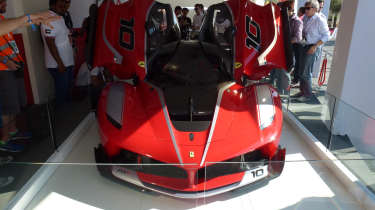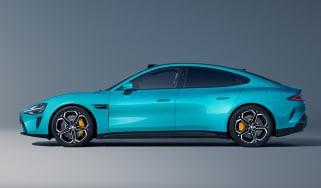LaFerrari FXX K video on track
New video of LaFerrari FXX K spitting blue flames in Abu Dhabi. Updates, details and pictures here
Ferrari has revealed its LaFerrari FXX K at the Yas Marina circuit in Abu Dhabi. As the extreme, track only version of the already rapid hypercar, the LaFerrari FXX K is the Italian carmaker’s answer to McLaren’s P1 GTR.
Here it is on track at Yas Marina:
Said GTR has a massive 986bhp, but rather than matching it the LaFerrari dwarfs output with truly stratospheric levels of performance. Get this: 1034bhp and more than 664lb ft of torque. That’s 84bhp more than the LaFerrari road car, and that thing doesn’t exactly hang about.
There’s more; the LaFerrari FXX K also wears bodywork that produces a staggering 50 per cent more downforce in low-drag mode, and 30 per cent more in high-downforce mode. That equates to 540kg of downforce at 124mph. How does that translate on track? Its 1min 14sec laptime around Ferrari's Fiorano test track is 5sec quicker than the road LaFerrari. Five seconds.
Ferrari says that the car only uses the LaFerrari's architecture, and the rest is developed using knowledge and technology developed from racing. Le Mans and Formula 1 are the main contributors, which bodes well for performance... It also explains how 90kg was shaved off the LaFerrari road car's 1255kg dry weight in the FXX K.
So how have these substantial increases in performance come about? That extra power arrives thanks to the LaFerrari FXX K’s naturally aspirated V12 heart receiving new camshafts, and a modified valve train with mechanical tappets instead of the standard car’s hydraulic items.
The intake manifolds are new and receive an advanced polishing treatment to smooth airflow into the 12-cylinders, while the exhaust system has been optimised to offer further performance and ditches the road car’s restrictive silencers.
That will ensure that the 6.2-litre V12 will be much, much louder as it sings towards its own peak performance of 847bhp (up from 790) at 9000rpm and into its 9250rpm limiter. Like in the road car, it sends power through Ferrari’s seven-speed DCT gearbox.
Just listen to it in this fan video here:
The bottom end is where the heavily uprated HY-KERS system comes into play. The LaFerrari FXX K is named as such because of this even more extreme electronic system, which helps to mask the V12’s ever-so-slightly less savage bottom end. The HY-KERS produces 187bhp alone (an extra 27bhp) and sends power directly through Ferrari’s latest E-Diff 3 electronic differential.
The system can be configured through four modes that Ferrari says deliver ‘maximum efficiency at every stage of every track lap.’ The driver can flick through each mode via the Manettino switch on the centre console.
Qualify is used for maximum performance but drains the batteries as a result; Long Run is optimised for consistent performance, with both the KERS and V12 providing as much power as possible without depleting the batteries; Manual Boost works like a ‘push-to-pass’ button with maximum torque available on request; and Fast Charge prioritises recharging the batteries as quickly as possible.
The active-aero bodywork has been designed to work in conjunction with these four modes, with far more aggressive variances between its slipperiest and most downforce-heavy settings. With the active-aero closed, the car wears a fixed twin-profile spoiler and larger front splitter that sits 30mm lower and features a gap in the centre.
Each side gets an endplate and dive plane with vertical fins to direct and channel air towards the car’s flanks, creating a longitudinal vortex resulting in reduced air pressure, sucking the wake to the edge of the aerodynamic underbody. In Lehman’s terms, the results keep dense air away from the drag heavy region around the wheels and wheel arches, helping to reduce pressure and increase downforce. Side skirts then keep airflow along the side of the car separated from the underbody to further reduce drag.
Much of the floor's design has been created using knowledge developed in Ferrari's Le Mans efforts with its 458 Italia GTE racing cars.
The rear is the business end for downforce. The tail has been raised and features an active-spoiler that extends out 60mm when fully deployed. A vertical fin and short, fixed wing either side of the tail work as guide vanes in low-drag mode, and even help to boost the active-spoiler’s efficiency in high-downforce mode.
Below, a serious-looking rear diffuser draws air out from under the car, which itself features a by-pass duct to direct airflow around the rear wheels and minimise the drag they create.
The limiting factor for grip on the road car is its road tyres. That's not something the LaFerrari FXX K will worry about, because grip is substantially increased with a set of Pirelli P-Zero slicks of 285 front and 345 rear widths, wrapped around 19- and 20-inch wheels. Each tyre is equipped with sensors that monitor longitudinal, lateral and radial acceleration, along with temperature and pressure. This data is then absorbed by the EF1-Trac traction control system to offer maximum performance (just like Sebastian Vettel's 2015 F1 car...).
The E-Diff, traction control and Racing SSC (Side Slip Angle Control) have all been specially calibrated to suit the extra grip of slick tyres, while the similarly adjusted ABS system’s interference can be increased and decreased via a five-position Manettino on the steering wheel.
Carbon-ceramic brakes are 398mm and 380mm in diameter, and the car sits low on magnetorheological dampers with twin solenoids (Al-Ni tube) much like the road car, guaranteeing neck-snapping stopping power and ultra-effective body control.
The car is painted red, obviously, and wears silver streaks, numbering and Italian decals. Slimmer LED lights and 10-spoke centre-lock wheels add to the modern-racer look, whilst the stripped interior filled with exposed carbon and a pair of fixed bucket seats confirms the car’s purpose.
Prices are around 2.5 million Euros (just short of £2 million), and that buys you the car and two years worth of support from Ferrari, where they look after and maintain the car. After that, you have the option to renew for a reduced price, or alternatively you can take the car home. But Ferrari doesn't expect any of its customers to do that.
'Less than' forty cars will be produced, though Ferrari says it could consider making more if cash heavy buyers demand so. That being said, every single one of the planned cars is spoken for. As is the trend with Ferrari’s track-only cars, buyers will be able to attend track events in the XX programme, like the one at the Abu Dhabi unveiling, where they can drive their cars on world class circuits with full pit team support. And when we asked if current LaFerrari owners could 'upgrade' their road cars to close to FXX K spec, Ferrari politely said 'absolutely not.'
Specifications
| Engine | V12, 6262cc, plus 187bhp electric motor |
| Max power | 1034bhp |
| Max torque | at least 664lb ft |
| 0-60 | 'even less' than the road car's sub 3sec! |
| Top speed | Expected 217mph |
Watch our video review of the road going LaFerrari here:



